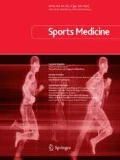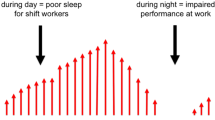Abstract
Background
Current recommendations advise against exercising in the evening because of potential adverse effects on sleep.
Objectives
The aim of this systematic review was to investigate the extent to which evening exercise affects sleep and whether variables such as exercise intensity or duration modify the response.
Methods
A systematic search was performed in PubMed, Cochrane, EMBASE, PsycINFO, and CINAHL databases. Studies evaluating sleep after a single session of evening physical exercise compared to a no-exercise control in healthy adults were included. All analyses are based on random effect models.
Results
The search yielded 11,717 references, of which 23 were included. Compared to control, evening exercise significantly increased rapid eye movement latency (+ 7.7 min; p = 0.032) and slow-wave sleep (+ 1.3 percentage points [pp]; p = 0.041), while it decreased stage 1 sleep (− 0.9 pp; p = 0.001). Moderator analyses revealed that a higher temperature at bedtime was associated with lower sleep efficiency (SE) (b = − 11.6 pp; p = 0.020) and more wake after sleep onset (WASO; b = + 37.6 min; p = 0.0495). A higher level of physical stress (exercise intensity relative to baseline physical activity) was associated with lower SE (− 3.2 pp; p = 0.036) and more WASO (+ 21.9 min; p = 0.044). Compared to cycling, running was associated with less WASO (− 12.7 min; p = 0.037). All significant moderating effects disappeared after removal of one study.
Conclusion
Overall, the studies reviewed here do not support the hypothesis that evening exercise negatively affects sleep, in fact rather the opposite. However, sleep-onset latency, total sleep time, and SE might be impaired after vigorous exercise ending ≤ 1 h before bedtime.







Similar content being viewed by others
References
Mignot E. Why we sleep: the temporal organization of recovery. PLoS Biol. 2008;6(4):e106.
Kohatsu ND, Tsai R, Young T, Vangilder R, Burmeister LF, Stromquist AM, et al. Sleep duration and body mass index in a rural population. Arch Intern Med. 2006;166(16):1701–5.
Taveras EM, Rifas-Shiman SL, Oken E, Gunderson EP, Gillman MW. Short sleep duration in infancy and risk of childhood overweight. Arch Pediatr Adolesc Med. 2008;162(4):305–11.
Gottlieb DJ, Punjabi NM, Newman AB, Resnick HE, Redline S, Baldwin CM, et al. Association of sleep time with diabetes mellitus and impaired glucose tolerance. Arch Intern Med. 2005;165(8):863–7.
King CR, Knutson KL, Rathouz PJ, Sidney S, Liu K, Lauderdale DS. Short sleep duration and incident coronary artery calcification. JAMA. 2008;300(24):2859–66.
Opp MR, Toth LA. Neural-immune interactions in the regulation of sleep. Front Biosci. 2003;8:d768–79.
Cohen S, Doyle WJ, Alper CM, Janicki-Deverts D, Turner RB. Sleep habits and susceptibility to the common cold. Arch Intern Med. 2009;169(1):62–7.
Cappuccio FP, D’Elia L, Strazzullo P, Miller MA. Sleep duration and all-cause mortality: a systematic review and meta-analysis of prospective studies. Sleep. 2010;33(5):585–92.
Ohayon MM. Epidemiology of insomnia: what we know and what we still need to learn. Sleep Med Rev. 2002;6(2):97–111.
Smith MT, Perlis ML, Park A, Smith MS, Pennington J, Giles DE, et al. Comparative meta-analysis of pharmacotherapy and behavior therapy for persistent insomnia. Am J Psychiatry. 2002;159(1):5–11.
Kredlow MA, Capozzoli MC, Hearon BA, Calkins AW, Otto MW. The effects of physical activity on sleep: a meta-analytic review. J Behav Med. 2015;38(3):427–49.
Kubitz KA, Landers DM, Petruzzello SJ, Han M. The effects of acute and chronic exercise on sleep. A meta-analytic review. Sports Med. 1996;21(4):277–91.
Youngstedt SD, O’Connor PJ, Dishman RK. The effects of acute exercise on sleep: a quantitative synthesis. Sleep. 1997;20(3):203–14.
Uchida S, Shioda K, Morita Y, Kubota C, Ganeko M, Takeda N. Exercise effects on sleep physiology. Front Neurol. 2012;3:48.
American Academy of Sleep Medicine. International Classification of Sleep Disorders, revised: diagnostic and coding manual. Chicago: American Academy of Sleep Medicine; 2001.
Buman MP, Phillips BA, Youngstedt SD, Kline CE, Hirshkowitz M. Does nighttime exercise really disturb sleep? Results from the 2013 National Sleep Foundation Sleep in America Poll. Sleep Med. 2014;15(7):755–61.
Browman CP, Tepas DI. The effects of presleep activity on all night sleep. Psychophysiology. 1976;13(6):536–40.
Oda S, Shirakawa K. Sleep onset is disrupted following pre-sleep exercise that causes large physiological excitement at bedtime. Eur J Appl Physiol. 2014;114(9):1789–99.
Morita Y, Sasai-Sakuma T, Inoue Y. Effects of acute morning and evening exercise on subjective and objective sleep quality in older individuals with insomnia. Sleep Med. 2017;34:200–8.
Myllymäki T, Kyröläinen H, Savolainen K, Hokka L, Jakonen R, Juuti T, et al. Effects of vigorous late-night exercise on sleep quality and cardiac autonomic activity. J Sleep Res. 2011;20(1 PART II):146–53.
Driver HS, Meintjes AF, Rogers GG, Shapiro CM. Submaximal exercise effects on sleep patterns in young women before and after an aerobic training programme. Acta Physiol Scand. 1988;134(SUPPL. 574):8–13.
O’Connor PJ, Breus MJ, Youngstedt SD. Exercise-induced increase in core temperature does not disrupt a behavioral measure of sleep. Physiol Behav. 1998;64(3):213–7.
Liberati A, Altman DG, Tetzlaff J, Mulrow C, Gøtzsche PC, Ioannidis JPA, et al. The PRISMA statement for reporting systematic reviews and meta-analyses of studies that evaluate healthcare interventions: explanation and elaboration. BMJ. 2009;339:b2700.
Harris JD, Quatman CE, Manring MM, Siston RA, Flanigan DC. How to write a systematic review. Am J Sports Med. 2014;42(11):2761–8.
Vein AM, Sidorov AA, Murtazaev MS, Karlov AV. Physical exercise and nocturnal sleep in healthy humans. Hum Physiol. 1991;17(6):391–7.
Desjardins J, Healey T, Broughton R. Early evening exercise and sleep. Sleep Res. 1974;3:447–50.
Higgins J, Green S. Cochrane handbook for systematic reviews of interventions. Hoboken: Wiley-Blackwell; 2008.
Vitale JA, Bonato M, Galasso L, La Torre A, Merati G, Montaruli A, et al. Sleep quality and high intensity interval training at two different times of day: a crossover study on the influence of the chronotype in male collegiate soccer players. Chronobiol Int. 2017;34(2):260–8.
Follmann D, Elliott P, Suh I, Cutler J. Variance imputation for overviews of clinical trials with continuous response. J Clin Epidemiol. 1992;45(7):769–73.
Rosenthal R. Meta-analytic procedures for social research. California: Sage; 1991.
Higgins JP, Altman DG, Gotzsche PC, Juni P, Moher D, Oxman AD, et al. The Cochrane Collaboration’s tool for assessing risk of bias in randomised trials. BMJ. 2011;343:d5928.
Higgins JPT, Thompson SG, Deeks JJ, Altman DG. Measuring inconsistency in meta-analyses. BMJ. 2003;327(7414):557–60.
Flausino NH, Prado JM, Queiroz SS, Tuik S, Mello MT. Physical exercise performed before bedtime improves the sleep pattern of healthy young good sleepers. Sleep. 2012;35:A442–3.
Agnew HW Jr, Webb WB, Williams RL. The first night effect: an EEG study of sleep. Psychophysiology. 1966;2(3):263–6.
Bulckaert A, Exadaktylos V, Haex B, De Valck E, Verbraecken J, Berckmans D. Elevated variance in heart rate during slow-wave sleep after late-night physical activity. Chronobiol Int. 2011;28(3):282–4.
Kern W, Perras B, Wodick R, Fehm HL, Born J. Hormonal secretion during nighttime sleep indicating stress of daytime exercise. J Appl Physiol. 1995;79(5):1461–8.
Robey E, Dawson B, Halson S, Gregson W, King S, Goodman C, et al. Effect of evening postexercise cold water immersion on subsequent sleep. Med Sci Sports Exerc. 2013;45(7):1394–402.
Borenstein M, Hedges LV, Higgins JP, Rothstein HR. Introduction to meta-analysis. Ltd: Wiley; 2009.
Duval S, Tweedie R. Trim and fill: a simple funnel-plot-based method of testing and adjusting for publication bias in meta-analysis. Biometrics. 2000;56(2):455–63.
Alley JR, Mazzochi JW, Smith CJ, Morris DM, Collier SR. Effects of resistance exercise timing on sleep architecture and nocturnal blood pressure. J Strength Cond Res. 2015;29(5):1378–85.
Arias P, Madinabeitia-Mancebo E, Santiago M, Corral-Bergantinos Y, Robles-Garcia V. Effects of early or late-evening fatiguing physical activity on sleep quality in non-professional sportsmen. J Sports Med Phys Fitness. 2016;56(5):597–605.
Baekeland F, Lasky R. Exercise and sleep patterns in college athletes. Percept Mot Skills. 1966;23(3, PT. 2):1203–7.
Browman CP. Sleep following sustained exercise. Psychophysiology. 1980;17(6):577–80.
Hauri P. Effects of evening activity on early night sleep. Psychophysiology. 1968;4(3):266–77.
Hauri P. The influence of evening activity on the onset of sleep. Psychophysiology. 1969;5(4):426–30.
Hauri P. Evening activity, sleep mentation, and subjective sleep quality. J Abnorm Psychol. 1970;76(2):270–5.
Myllymäki T, Rusko H, Syväoja H, Juuti T, Kinnunen M, Kyröläinen H. Effects of exercise intensity and duration on nocturnal heart rate variability and sleep quality. Eur J Appl Physiol. 2012. https://doi.org/10.1007/s00421-011-2034-9.
Yamanaka Y, Hashimoto S, Takasu NN, Tanahashi Y, Nishide SY, Honma S, et al. Morning and evening physical exercise differentially regulate the autonomic nervous system during nocturnal sleep in humans. Am J Physiol Regul Integr Comp Physiol. 2015;309(9):R1112–21.
Yoshida H, Ishikawa T, Shiraishi F, Kobayashi T. Effects of the timing of exercise on the night sleep. Psychiatr Clin Neurosci. 1998;52(2):139–40.
American College of Sports Medicine. ACSM’s guidelines for exercise testing and prescription. Baltimore: Lippincott Williams & Wilkins; 2013.
Marti B, Laukkanen R, Held T. Beurteilung der Ausdauer aufgrund der VO2, max: Standards des BASPO. Schweiz Z Sportmed Sporttraumatol. 1999;47:173–4.
Garber CE, Blissmer B, Deschenes MR, Franklin BA, Lamonte MJ, Lee IM, et al. American College of Sports Medicine position stand. Quantity and quality of exercise for developing and maintaining cardiorespiratory, musculoskeletal, and neuromotor fitness in apparently healthy adults: guidance for prescribing exercise. Med Sci Sports Exerc. 2011;43(7):1334–59.
Goelema MS, Regis M, Haakma R, van den Heuvel ER, Markopoulos P, Overeem S. Determinants of perceived sleep quality in normal sleepers. Behav Sleep Med. 2017. https://doi.org/10.1080/15402002.2017.1376205.
Lorenzo JL, Barbanoj MJ. Variability of sleep parameters across multiple laboratory sessions in healthy young subjects: the “very first night effect”. Psychophysiology. 2002;39(4):409–13.
Carskadon MA, Dement WC. Nocturnal determinants of daytime sleepiness. Sleep. 1982;5(Suppl 2):S73–81.
Schmidt RF, Lang F, Heckmann M. Physiologie des Menschen. Berlin: Springer; 2011.
Exercise at This Time of Day for Optimal Sleep. 2017. https://sleep.org/articles/exercise-time-of-day/. Accessed 20 Dec 2017.
McGinty D, Szymusiak R. Keeping cool: a hypothesis about the mechanisms and functions of slow-wave sleep. Trends Neurosci. 1990;13(12):480–7.
Jordan J, Montgomery I, Trinder J. The effect of afternoon body heating on body temperature and slow wave sleep. Psychophysiology. 1990;27(5):560–6.
Murphy PJ, Campbell SS. Nighttime drop in body temperature: a physiological trigger for sleep onset? Sleep. 1997;20(7):505–11.
Tsai HJ, Kuo TB, Lin YC, Yang CC. The association between prolonged sleep onset latency and heart rate dynamics among young sleep-onset insomniacs and good sleepers. Psychiatry Res. 2015;230(3):892–8.
Okamoto-Mizuno K, Yamashiro Y, Tanaka H, Komada Y, Mizuno K, Tamaki M, et al. Heart rate variability and body temperature during the sleep onset period. Sleep Biol Rhythms. 2008;6(1):42–9.
Nieman DC, Luo B, Dreau D, Henson DA, Shanely RA, Dew D, et al. Immune and inflammation responses to a 3-day period of intensified running versus cycling. Brain Behav Immun. 2014;39:180–5.
Halson SL. Sleep in elite athletes and nutritional interventions to enhance sleep. Sports Med. 2014;44(Suppl 1):S13–23.
Short KR, Sedlock DA. Excess postexercise oxygen consumption and recovery rate in trained and untrained subjects. J Appl Physiol. 1997;83(1):153–9.
Acknowledgements
The authors would like to thank Dr. Jacopo Vitale for providing unpublished data, Dr. med Niels Hagenbuch and Dr. Ulrike Held (Epidemiology, Biostatistics and Prevention Institute, University of Zürich) and the statistical consulting service of ETH Zürich for statistical support.
Author information
Authors and Affiliations
Corresponding author
Ethics declarations
Funding
No sources of funding were used to assist in the preparation of this article.
Conflict of interest
Jan Stutz, Remo Eiholzer and Christina Spengler declare that they have no conflicts of interest relevant to the content of this review.
Electronic supplementary material
Below is the link to the electronic supplementary material.
Rights and permissions
About this article
Cite this article
Stutz, J., Eiholzer, R. & Spengler, C.M. Effects of Evening Exercise on Sleep in Healthy Participants: A Systematic Review and Meta-Analysis. Sports Med 49, 269–287 (2019). https://doi.org/10.1007/s40279-018-1015-0
Published:
Issue Date:
DOI: https://doi.org/10.1007/s40279-018-1015-0




